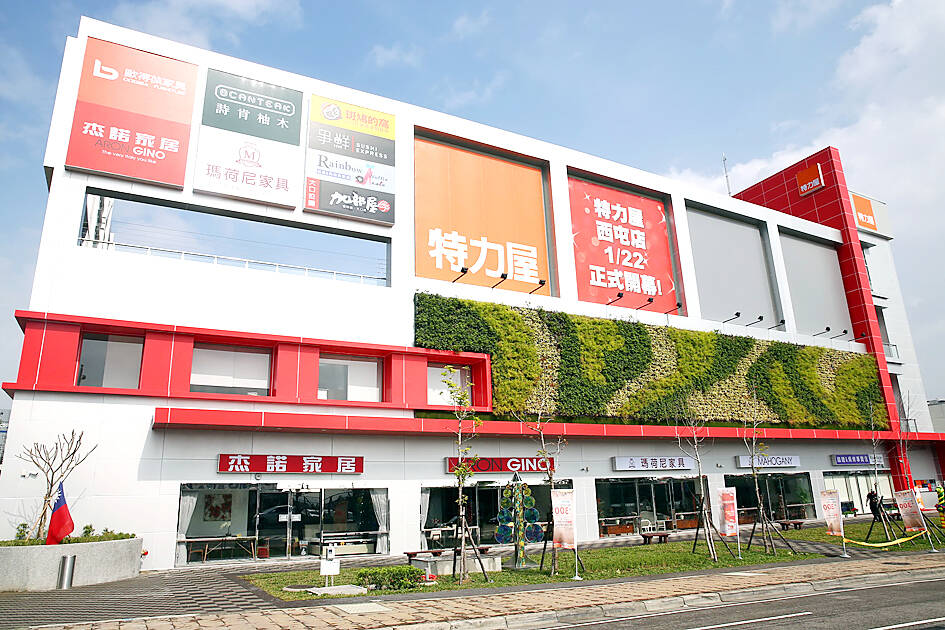Test Rite International Co (特力), a Taiwanese company engaged primarily in trading and retail businesses, yesterday announced a capital increase for its subsidiary Test Rite Retail Co (特力屋), plus an initial public offering within three years.
The home improvement retail unit would issue 26 million common shares at NT$38 per share, raising a total of NT$988 million to strengthen its working capital, the parent company said.
A majority of 85 percent of the new shares will be subscribed by the company’s existing shareholders, while the remaining 15 percent will be reserved for its employees, it said.

Photo: Chang Jing-ya, Taipei Times
The capital increase would boost the retail unit’s paid-in capital from NT$700 million to NT$960 million, with the parent company’s stake declining from 100 percent to 72.92 percent, it said.
The retail unit currently operates 63 stores across Taiwan including 28 large stores and 35 community outlets. It is seeking to expand its retail footprint by adding 6 new stores this year, bringing the total to 69 locations, the company said.
In addition, the unit is actively expanding its service-oriented business highlighting the offer of free professional consultation and in-home services.
This program has seen positive results in pilot locations in Taipei and New Taipei City, the company said, adding that it would expand the program to six more stores this year.
In the future, the unit plans to accelerate its e-commerce development, focusing on home renovation solutions, while strengthening its online-merge-offline model to drive overall revenue growth, it said.
Test Rite International reported consolidated revenue of NT$36.77 billion for last year, an increase of 3.65 percent from the previous year, with NT$19.77 billion from the trading business and NT$17 billion from the retail business. It serves retailers at home and abroad, including Wal-Mart Inc, Sam's Club, Target Corp, Office Depot Inc and Carrefour SA.

Zhang Yazhou was sitting in the passenger seat of her Tesla Model 3 when she said she heard her father’s panicked voice: The brakes do not work. Approaching a red light, her father swerved around two cars before plowing into a sport utility vehicle and a sedan, and crashing into a large concrete barrier. Stunned, Zhang gazed at the deflating airbag in front of her. She could never have imagined what was to come: Tesla Inc sued her for defamation for complaining publicly about the vehicles brakes — and won. A Chinese court ordered Zhang to pay more than US$23,000 in

Taiwan Semiconductor Manufacturing Co (TSMC, 台積電) yesterday said that its investment plan in Arizona is going according to schedule, following a local media report claiming that the company is planning to break ground on its third wafer fab in the US in June. In a statement, TSMC said it does not comment on market speculation, but that its investments in Arizona are proceeding well. TSMC is investing more than US$65 billion in Arizona to build three advanced wafer fabs. The first one has started production using the 4-nanometer (nm) process, while the second one would start mass production using the

US President Donald Trump has threatened to impose up to 100 percent tariffs on Taiwan’s semiconductor exports to the US to encourage chip manufacturers to move their production facilities to the US, but experts are questioning his strategy, warning it could harm industries on both sides. “I’m very confused and surprised that the Trump administration would try and do this,” Bob O’Donnell, chief analyst and founder of TECHnalysis Research in California, said in an interview with the Central News Agency on Wednesday. “It seems to reflect the fact that they don’t understand how the semiconductor industry really works,” O’Donnell said. Economic sanctions would

‘NO DISRUPTION’: A US trade association said that it was ready to work with the US administration to streamline the program’s requirements and achieve shared goals The White House is seeking to renegotiate US CHIPS and Science Act awards and has signaled delays to some upcoming semiconductor disbursements, two sources familiar with the matter told reporters. The people, along with a third source, said that the new US administration is reviewing the projects awarded under the 2022 law, meant to boost US domestic semiconductor output with US$39 billion in subsidies. Washington plans to renegotiate some of the deals after assessing and changing current requirements, the sources said. The extent of the possible changes and how they would affect agreements already finalized was not immediately clear. It was not known